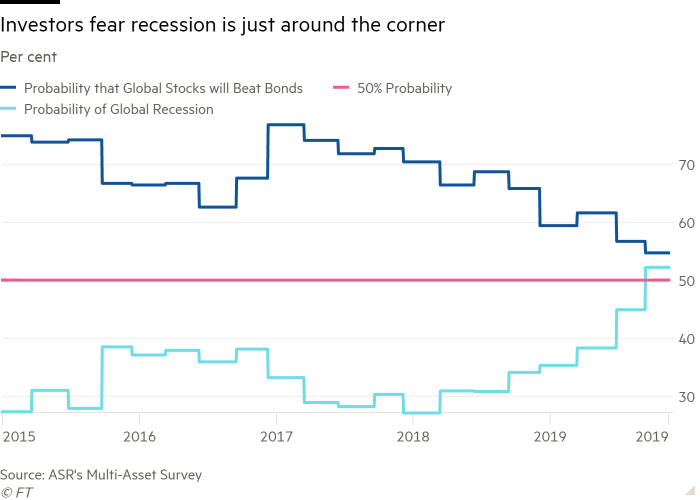Views of 200 institutions that oversee a combined $4.1tn in assets paint gloomy picture
Investors are increasingly fearful of a global recession, according to a survey of many of the world’s biggest asset managers. The likelihood of a downturn in the next year — driven by concerns over geopolitical uncertainty and trade tensions — stands at 52 per cent, according to the findings from Absolute Strategy Research.
This is the first time since the survey began in 2014 that investors have seen a greater than 50 per cent chance of a recession. The findings from ASR, which surveyed more than 200 institutions that manage a combined $4.1tn in assets, indicate that investors’ views on the outlook for business confidence and corporate earnings have dimmed. The respondents also expected US unemployment to rise over the next year.
“People have definitely bought into the bearish macro view,” said David Bowers, ASR’s head of research. “When you look at the pattern over the past four or five years, it is definitely quite an important inflection point.” The views coincide with the global manufacturing sector experiencing its sharpest decline in at least six years and a warning by the OECD that the world’s biggest economies are in danger of falling into a “low-growth trap”.
The group last week downgraded its economic forecasts for almost all the countries it examines. Yet despite the gloom, investors still expect stocks to outperform bonds over the next year. However, they assigned a less than 50 per cent chance of equities being higher a year from now.

One of the key questions is whether central bankers from Washington to Frankfurt will be successful in propping up their flagging economies as they loosen monetary policy, with the US Federal Reserve cutting interest rates for the second time this year last week and the European Central Bank launching another stimulus package. ASR’s survey suggests investors are hoping that monetary policy will smooth the way ahead.
“They haven’t gone maximum defensive,” said Mr Bowers. “People are thinking the cavalry is going to come quickly to create stimulus to provide that turnaround.”
Source: FT





